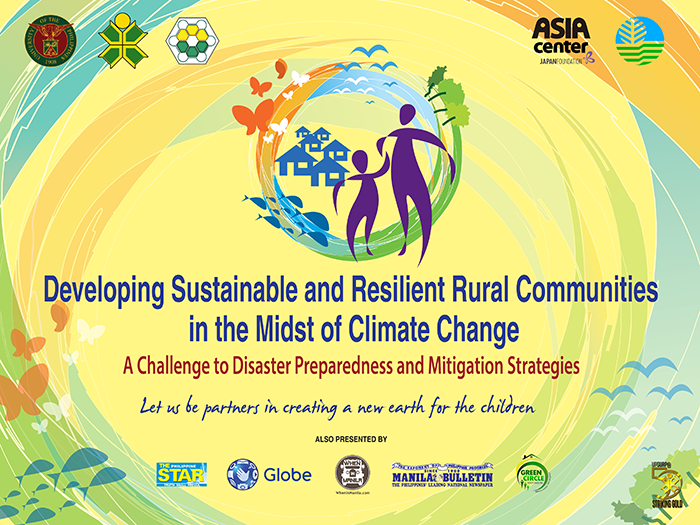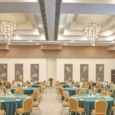The University of the Philippines – School of Urban and Regional Planning (UP-SURP), and UP PLANADES will hold an international conference on Dec 1-2, 2015, at the Crowne Plaza Manila Galleria, focusing on various designs and strategies in developing our rural communities towards sustainability in the face of climate change. Co-convenors are the Asian Center Japan Foundation and the Department of Environment and Natural Resources (DENR). Shown during the contract signing are: Ma. Sabrina R. Cruz, DENR Director for Strategic Communication and Initiatives Services (SCIS); Conference Director Dr. Mayu T. Munarriz; Hiroaki Uesugi, Director of The Japan Foundation Manila; Rowena R. Ganibi, Media Production Specialist III, DENR-SCIS; and Rolando B. Samson, Program Director of The Japan Foundation Manila.
Dubbed as Developing Sustainable And Resilient Rural Communities In The Midst Of Climate Change: A Challenge To Disaster Preparedness And Mitigation Strategies, the conference will be on December 1-2, 2015, from 8:00 am to 5:00 pm, at the Crowne Plaza Manila Galleria, in Quezon City. It aims to present designs, experiences and possible solutions in an effort to better prepare the country for the continuing effects of climate change.
The focus on rural communities is a first in urban and regional planning discussions. UP-SURP, which has successfully sponsored similar conferences, including one on Smarter Cities and another on Green Urbanism, presents this timely event in its vision to bring attention to the countryside, where most of our food and water resources are found. Climate change is expected to alter habitats and ecosystems, affecting all sectors and industries. The international conference brings together experts in various fields to share their research, experiences and suggestions towards shaping a better response to the changing environment. Most foreign speakers will come from neighboring Southeast Asian countries, which have similar environmental conditions as our own.
The conference is presented by the University of the Philippines, UP-School of Urban and Regional Planning, UP-PLANADES or Planning and Development Research Foundation, Inc., Asian Center Japan Foundation, and the Department of Environment and Natural Resources (DENR). Conference topics include: Land Management, Agricultural Tourism; Reforestation; Mangrove Forests and Climate Change; Shelter Security of Coastal Communities; Sustainable Seafood Supply; Teaming Up for Disaster Resiliency; Improvements in Irrigation; Solar Energy; Reducing the Incidence of Water and Energy Shortage; Transportation and Communications Designs for Disaster Preparedness; Early Warning Systems; and others.
The conference is envisioned to yield results that will affect the entire country. There is an urgent need to plan and develop strategies for the primary sector, i.e, agriculture, fisheries and forestry, as well as our water and energy resources. Improved transportation and communications for rural areas likewise become significant. It is hoped that this forum will encourage a more systematic assessment of climate change impacts, and help launch the development of relevant designs, systems and infrastructure.
Registration fee for the 2-day conference is P4,000 per participant. Inquiries may be directed to The Secretariat, Sustainable Rural Communities, c/o Atty Mark Gamboa or MsLinaCaluag, with office address at G/F SURP Building, E. Jacinto St., UP Campus, Diliman, Quezon City, Metro Manila. Interested parties may also contact UP-SURP telefax (+63 2) 929-1637, Tel (+63 2) 920-6853, or email enp.mamgamboa@gmail.com
UP-SURP aims to become the international center for urban and regional planning in the Asian-Pacific region. To maintain its relevance to current realities, the School plans to continue to be creative and innovative in its offerings of urban and regional planning courses, especially in the directions of sustainability; climate change adaptation; disaster risk reduction; resettlement and redevelopment; transport impact assessment and planning; strategic environmental assessment; and public-private partnerships for the urban environment.





